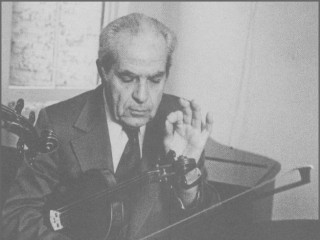
Felix Galimir biography
Date of birth : 1910-05-12
Date of death : 1999-11-10
Birthplace : Vienna, Austria
Nationality : Austrian
Category : Famous Figures
Last modified : 2011-11-16
Credited as : violinist, music teacher, Juilliard School
0 votes so far
Galimir spent his childhood in Nazi-occupied Europe. He was born to Jewish parents in Vienna, Austria at a time when Romania and Austria were freshly recovering from a war, and the two countries remained at odds. As a boy he felt alienated, not only as a Jew, but also because of his mixed parentage of Austrian and Romanian descent. Austria at that time was also at odds with Italy, thus Galimir in his youth adopted German as a second language because his family language, a dialect called Ladino, was readily mistaken for Italian. Emotionally, Galimir was an outsider in his own homeland.
Galimir's affinity for playing the violin became clearly apparent in his youth. At the age of 12 he began his studies at the Vienna Conservatory under the instruction of Adolf Bak on the violin and Simon Pullman as a chamber music coach. Galimir learned many songs by sight-reading them because the compositions were unfamiliar to him. As a result he heard many songs for the first time in his head as he learned to play them for himself. In 1927 the enterprising Galimir and his three sisters formed a string quartet in commemoration of the centennial of the death of the composer Ludwig van Beethoven. Additionally, in 1929, while still in his teens, he founded an ensemble, the Galimir String Quartet. The quartet was a youth group and endured into the 1990s.
As a young man during the 1930s Galimir studied under Carl Flesch, and it was around that same time that Galimir first came to prominence. For his solo debut, he performed Beethoven's Violin Concerto and readily won the admiration of his peers. Among his admirers, the composer Maurice Ravel came forward in 1936 when Galimir recorded "Lyric Suite" and "String Quartet" with his own string quartet. The musicians were honored to have the assistance of composer Ravel as a coach for the project. The recording won the Grand Prix du Disque in 1937. Earlier, in 1931, Alban Berg, who was also an acquaintance of Galimir, coached the Quartet. He wrote of the experience, "To Felix Galimir, outstanding quartet leader, excellent violinist, splendid musician, in remembrance," according to Allan Kozinn of the New York Times. Also among Galimir's numerous professional friends were Arnold Schoenberg and the many artists associated with Schoenberg's Society for Contemporary Music--including Anton Webern, Ernst Krenek, Alexander von Zemlinsky, and others.
In 1936, against the tense pre-World War II atmosphere of Vienna, Galimir joined the Vienna Philharmonic. Despite the honor, Galimir found himself victimized nonetheless by the anti-Semitic climate of Nazi Europe. One resort in Austria banned him altogether from appearing in performance with the Philharmonic, and that incident led ultimately to his dismissal from the orchestra. Following his release from the Vienna Philharmonic, he moved to Palestine at the behest of the acclaimed violinist, Bronislaw Huberman. Huberman, who was in the process of creating a new orchestra, the Israel Philharmonic, successfully lured Galimir into joining the group. Galimir remained in the Middle East for two years. His parents and sisters meanwhile proceeded to Paris to escape the oppressive atmosphere.
In 1938 Galimir moved to New York. That same year he performed a debut recital at the Town Hall, and in time he revived the Galimir String Quartet for performances at the New York Times' radio station, WQXR. The following year Galimir joined Arturo Toscanini's NBC Symphony as a first violinist. Galimir played with that group until 1954 and then began a two-year stint as the concertmaster of the NBC Symphony of the Air. Also in 1954 he joined the faculty of the City College of New York. From that time forward, Galimir devoted much of his life to teaching. He indulged his love of chamber music as well, joining the New York Philomusica and also establishing a decades long association with the Marlboro Festival of Vermont. Galimir's presence at the festival ultimately spanned decades. There he performed along with Rudolf Serkin on piano and toured regularly with a festival ensemble called Musicians from Marlboro.
Galimir's stature as a teacher and musical coach grew steadily over the years. He joined the faculty of New York's Juilliard School in 1962, and simultaneously he taught at Curtis Institute in Philadelphia where he headed the chamber music department beginning in 1972. In 1976 he joined the faculty at Mannes College of Music in New York City. He participated as an instructor for the New York String Orchestra's seminar program for youth, and he coached a series of chamber music workshops with Isaac Stern conducting at performance venues that included Carnegie Hall.
Galimir followed his own teachings and routinely practiced his musical scales on a daily basis even as an octogenarian. Over the years, he made recordings for Decca, Columbia, Vanguard, and Period. Although he admitted readily that music was his life, he counted football and clock collecting among his hobbies.
Galimir's wife, Suzanne, passed away in 1998, and the following year, Galimir himself died of natural causes at his apartment in Manhattan on November 10, 1999. His friends paid tribute to him at a service at Riverside Memorial on Amsterdam Avenue in New York City.
Selected discography
Appears on:
-Bach: Brandenburg Concertos/Orchestral Suite No.4 , Sony, 1990.
-Marlboro Music Festival-40th Anniversary (Bach: Orchestral Suites Nos. 2 & 3) , Sony, 1990.
-Marlboro Music Festival: Beethoven Symphonies Nos. 7 & 8 , Sony, 1990.
-Schoenberg: Serenade, Op.24/Chamber Symphony No.1, Op.9 , Sony, 1990.
-Boccherini: Quintets No 2 , Vanguard, 1991.
-Dvor´k: Piano Quintet in A major, Op.81 , Vanguard, 1991.
-Webern Conducts Berg Violin Concerto , SBT, 1991.
-A Tribute to Sasha , Vanguard, 1993.
-On The Beautiful Blue Danube , CBS, 1998.
















